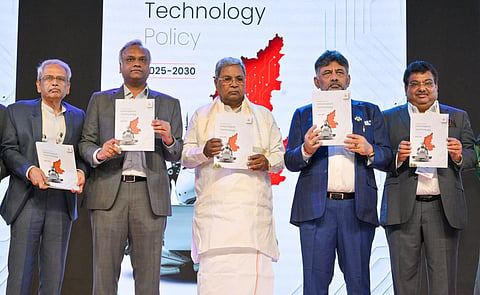

The Karnataka government on Tuesday, November 18, unveiled three new policies focusing on information technology, spacetech, and startups. At the inaugural day of the Bengaluru Tech Summit 2025, the flagship tech event organised by the state government, Chief Minister Siddaramaiah announced that the policies are aimed at making Karnataka a global destination for deeptech investments for the period between 2025 and 2030.
The three new policies unveiled are the Information Technology Policy, the SpaceTech Policy, and the Startup Policy. The IT policy focuses on driving innovation, strengthening digital infrastructure, and fostering emerging technologies such as artificial intelligence, cybersecurity, semiconductor design, and cloud computing. It seeks to boost IT penetration across tier II and III cities, enabling balanced regional development. The policy also promotes inclusive digital development through startups, women-led enterprises, and socially impactful tech solutions.
The space technology policy aims to capture 50% of India’s space market and significantly expand Karnataka’s footprint in the global space economy. It aims to strengthen both upstream and downstream space capabilities through dedicated manufacturing parks, advanced testing infrastructure, and a new centre of excellence.
Meanwhile, the startup policy aims to enable the creation of 25,000 startups over the next five years through strategic interventions in funding, market access, infrastructure, talent development, and social inclusion.
“We are building a future-ready state through centres of excellence in AI, cybersecurity, robotics, quantum, and the Beyond Bengaluru initiative to expand opportunities across districts. Karnataka continues to be India’s most trusted investment destination with clear policies and a culture that champions talent, innovation, and global ambition,” the Chief Minister said.
A major focus of the summit was the "Beyond Bengaluru" initiative. Siddaramaiah highlighted that Karnataka plans to decentralise its technology economy by developing tier II cities into the next generation of innovation clusters. “This is not merely an economic strategy but a commitment to equitable growth. Every district in Karnataka must have access to the opportunities of the digital age,” he said.
Echoing this policy direction, Karnataka IT & BT Minister Priyank Kharge said they were devising policies where investment comes towards the talent. Kharge remarked that the Local Economic Accelerator Programme is creating clusters across several regions and harnessing their demographic dividend. “We can innovate not just for Karnataka but for the world, which will come from beyond Bengaluru,” the Minister said.
Regarding physical infrastructure, Karnataka Deputy Chief Minister D K Shivakumar said, “We are investing more than Rs 1.5 lakh crore to push infrastructure at high speed.”
Additionally, Large and Medium Industries Minister M B Patil announced that a semiconductor park will come up on 200 acres of land in KWIN City, a 5,800-acre smart city project located between Dabaspet and Doddaballapur. “It will work as an innovation centre for all kinds of semiconductor sectors at the national and state levels,” Patil said.
The Bengaluru Innovation Report, jointly prepared by Startup Karnataka and 3one4 Capital, was also released at the summit. The report noted that Karnataka has over 50% of the artificial intelligence and machine learning talent pool in the country. Bengaluru is recognised as India’s AI and Quantum Computing hub, accounting for 58% of India’s AI start-up funding in the last five years. The city is home to USD 872 million in AI investments, leading the nation in both funding and deal count.
“Bengaluru is the fifth-largest unicorn hub globally, after Silicon Valley, New York, Beijing, and London, with 53 unicorns valued at USD 192 billion. This is more than any other Indian city, and Bengaluru’s unicorns contribute 42% of India’s total unicorn valuation,” the report stated. It also highlighted that Bengaluru has 39 soonicorns (startups with unicorn potential), compared with 30 in Delhi-NCR and 21 in Mumbai.
The report further said that Bengaluru leads the charge with the most capital raised by women founders. The city has seen a total of USD 13.4 billion being raised by Women-led startups, about 34% higher than Delhi NCR.
In terms of intellectual property, Bengaluru’s score of 910 in the global patents metric is comparable to Silicon Valley and Tokyo. Between 2020 and 2023, the city recorded the highest number of patents in India in computer science, electronics, and communication.
The 28th edition of the summit, themed “Futurise,” was inaugurated by Chief Minister Siddaramaiah on Tuesday, November 18. During the event, Minister Priyank Kharge launched KEO, a compact and affordable AI-ready personal computer. KEO is an acronym for "knowledge-driven, economical, and open-source," built in partnership with the Karnataka State Electronics Development Corporation (KEONICS).
The summit featured 10 focused conference tracks and over 80 knowledge sessions. It has welcomed participants from 60 countries and delegations from leading tech nations including the USA, UK, Israel, Japan, and Singapore. Prominent foreign delegates include Nicholas Reece, Lord Mayor of Melbourne, Australia, and Rafal Rosinski, Deputy Minister of Digitisation, Poland.